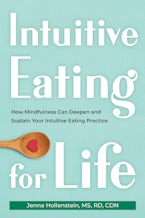By Jenna Hollenstein, MS, RD, CDN, author of Intuitive Eating for Life
Intuitive eating—a scientifically validated model of how to eat for improved physical and emotional well-being—could be described as: “simple, but not easy.” Only someone who hasn’t actually done it could say it’s just about eating when you’re hungry and stopping when you’re full. Those two pieces are essential, but there’s so much more to the relationship with food and body—and why they get distorted in the first place.
Living in a culture that places disproportionate emphasis on appearance—with a medical establishment that misconstrues the relationship between weight and health—has led many of us to ignore what our bodies are telling us in any given moment. Instead, we outsource expertise to gurus, apps, programs, and influencers—further confusing us about what, when, and how much to eat and move our bodies. Not to mention how to tend to our hearts and minds.
Intuitive eating is the antidote. It provides the container in which to rebuild trust and confidence both in and with your body. And while it is an undertaking that affects much more than how you eat, it doesn’t have to be overwhelming. Here are eight little ways to bring the wisdom of intuitive eating into your daily life.
Eat when you’re “gently hungry”
We’re wired to find food most appealing when we are biologically hungry. But ignore those signals of moderate hunger, and we get into a danger zone where eating feels frenetic, we often overeat, and we miss out on any real sense of satisfaction. Eating when you’re gently hungry, on the other hand, places you in that happy medium where food tastes good and you’re present and mindful enough to appreciate it.
Eat something you really like and try to be fully present
Fullness comes from eating a certain volume of food, but satisfaction comes from eating what you like. Give yourself permission to eat something you enjoy and to pay it your full attention so that you can savor the tastes, textures, and aromas you adore.
Let yourself experience comfort and pleasure
You deserve to feel good in your body. Often, we allow physical comfort and pleasure to go by the wayside. Then, suddenly eating in the absence of physical hunger becomes a primary source of soothing. When you prioritize comfort and pleasure, however, eating can be just one of many pleasurable activities you engage in. So, try to find one way to feel good in your body every day.
Move your body in a way that feels good
Your body was made to move in ways that are joyful, regulating, and fun. Teasing apart the exercise that you were told you should do from the types of movement that make you feel fully alive requires both thought work and somatic experimentation. Stretching, dancing to your favorite music, horsing around in the playground or backyard, and gardening are just a few examples. When you enjoy the feeling of moving, you don’t have to force yourself to do it.
Don’t feed diet talk
Exchanging diet tips and comparing results from different “lifestyle modifications” can serve as small talk, bonding among peers, and even alleviating social anxiety. But such diet talk only perpetuates the idea that there’s a right way and a wrong way to eat, move, and have a body. Instead of feeding diet talk, why not focus on why you’re happy to see someone or share something that made you really think.
Ask, “What am I feeling right now?“
Bodies are emotional. Eating is emotional. Being human is emotional. We have tons of feelings arising, abiding, and dissolving all the time but often remain unaware of them. Some feelings might be key to understanding our relationship with food and body. So, start asking yourself this question. Don’t worry if you don’t know the answer at first. With practice and patience, you’ll begin to understand yourself at a deeper level.
Decide what really matters to you
Oftentimes, the ways in which we feel, think, and behave in service of dieting don’t seem to match up with what we really care about in life. Take a moment to identify one thing you value right now, and question whether dieting really supports that value or not.
Remember to breathe
You can always pause and feel your breath. As a means of taking a rest, touching “home base,” and anchoring in the body, feeling the breath both calms the nervous system and slows things down so that you can notice emotions, thoughts, and behaviors in real time. A breath awareness meditation, such as shamatha-vipashyana, is one way to make feeling the breath a regular practice. But you can literally always just take one conscious, embodied breath to remind yourself: “I am right here.”
Jenna Hollenstein, MS, RD, CDN, is a nutrition therapist, meditation teacher, and author of five books. Her work combines intuitive eating, trauma-sensitive mindfulness, polyvagal theory, and other embodied modalities. Her work has been featured in Forbes, The Wall Street Journal, Self, Health, Lion’s Roar, Mindful, Vogue, Elle, Glamour, Women’s World, and U.S. News & World Report. Jenna lives in the greater New York City, NY, area.



 Part 2: What to Do When a Client Is Participating in Self-Judgment?
Part 2: What to Do When a Client Is Participating in Self-Judgment?